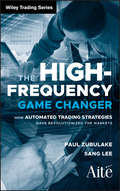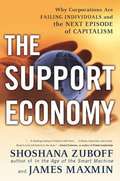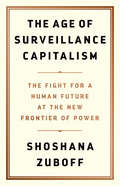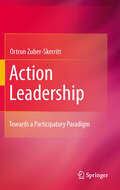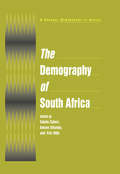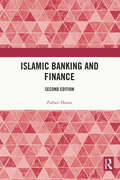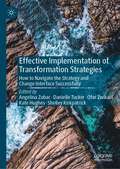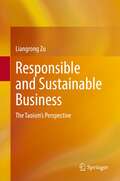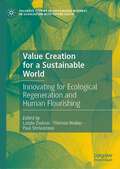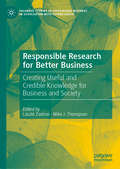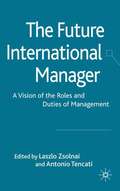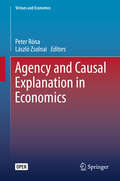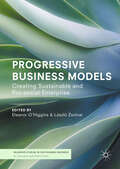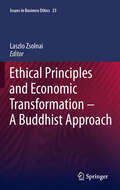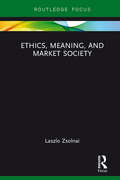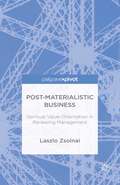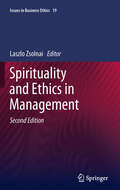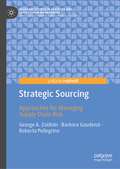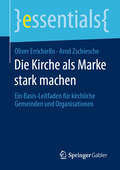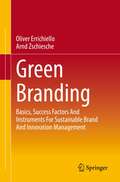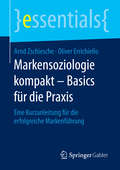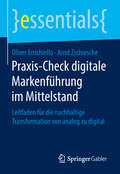- Table View
- List View
The High Frequency Game Changer
by Paul Zubulake Sang LeeThe financial industry's leading independent research firm's forward-looking assessment into high frequency trading Once regarded as a United States-focused trend, today, high frequency trading is gaining momentum around the world. Yet, while high frequency trading continues to be one of the hottest trends in the markets, due to the highly proprietary nature of the computer transactions, financial firms and institutions have made very little available in terms of information or "how-to" techniques. That's all changed with The High Frequency Game Changer: How Automated Trading Strategies Have Revolutionized the Markets. In the book, Zubulake and Lee present an overview of how high frequency trading is changing the face of the market. The book Explains how we got here and what it means to traders and investors Details how to build a high frequency trading firm, including the relevant tools, strategies, and trading talent Defines key components common to HFT such as algorithms, low latency trading infrastructure, collocation etc. The High Frequency Game Changer takes a highly controversial and extremely complicated subject and makes it accessible to anyone with an interest or stake in financial markets.
The Support Economy: Why Corporations Are Failing Individuals and the Next Episode of Capitalism
by Shoshana Zuboff James MaxminToday's "managerial" capitalism has grown hopelessly out of touch with the people it should be serving. The Support Economy explores the chasm between people and corporations and reveals a new society of individuals who seek relationships of advocacy and trust that provide support for their complex lives. Unlocking the wealth of these new markets can unleash the next great wave of wealth creation, but it requires a radically new approach--"distributed" capitalism. The Support Economy is a call to action for every citizen who cares about the future. .
The Age of Surveillance Capitalism: The Fight for a Human Future at the New Frontier of Power
by Shoshana ZuboffThe challenges to humanity posed by the digital future, the first detailed examination of the unprecedented form of power called "surveillance capitalism," and the quest by powerful corporations to predict and control our behavior. <P><P>Shoshana Zuboff's interdisciplinary breadth and depth enable her to come to grips with the social, political, business, and technological meaning of the changes taking place in our time. We are at a critical juncture in the confrontation between the vast power of giant high-tech companies and government, the hidden economic logic of surveillance capitalism, and the propaganda of machine supremacy that threaten to shape and control human life. <P><P>Will the brazen new methods of social engineering and behavior modification threaten individual autonomy and democratic rights and introduce extreme new forms of social inequality? Or will the promise of the digital age be one of individual empowerment and democratization? <P><P>The Age of Surveillance Capitalism is neither a hand-wringing narrative of danger and decline nor a digital fairy tale. Rather, it offers a deeply reasoned and evocative examination of the contests over the next chapter of capitalism that will decide the meaning of information civilization in the twenty-first century. The stark issue at hand is whether we will be the masters of information and machines or its slaves.
Action Leadership: Towards a Participatory Paradigm (Professional and Practice-based Learning)
by Ortrun Zuber-SkerrittAction leadership is a creative, innovative, collaborative and self-developed way to lead. It eschews the hierarchical structure usually associated with leadership and is based instead on the democratic values of freedom, equality, inclusion and self-realization. It take responsibility for, not control over, people through networking and orchestrating human energy towards a holistic outcome that benefits the common interest. Action leaders are passionate people who abide by the motto that "Learning does not mean to fill a barrel but rather to ignite a flame" in others. And in this time of rapid economic, political, technological, social and ecological changes, action leadership and action leaders are precisely what's needed to improve how people and organizations engage constructively to address the myriad complex issues challenging society at all levels. Action Leadership: Towards a Participatory Paradigm explains and illustrates how action leadership can be developed through participatory action learning and action research (PALAR). It addresses real-life issues by people who choose to work collaboratively towards shared goals while developing their learning, insights, knowledge, people skills and personal relationships through involvement in a PALAR project. The book provides a conceptual framework for action leadership and for the integrative, practical theory of PALAR; and examples of applications in higher education, management education for organization development, and community development. Readers are encouraged to adopt, adapt and further develop the evolving concepts of action leadership and PALAR in a participatory paradigm of learning, research and development.
The Demography of South Africa (A\general Demography Of Africa Ser.)
by Tukufu Zuberi Amson Sibanda Eric O. UdjoThis groundbreaking study of South Africa provides a unique look at the interplay of demographic, social and economic processes in a society undergoing rapid change as a result of the collapse of apartheid. It uses data from the first post-apartheid census as the basis for analysis of fertility, mortality within the context of HIV/AIDS, migration, education, employment, and household structure. These census data are complemented by large-scale household surveys and data from a partial registration system to study the relationships among various demographic, economic, and social phenomena. For the first time the demographic consequences of both the longer-term impact of apartheid policies and the policies of the new South Africa are examined and compared. This comprehensive reference links the demographic behavior of South Africa's various population groups to social, economic, and political inequalities created by policies of separate and unequal development. Prepared under the auspices of the Population Studies Center at the University of Pennsylvania, it is an essential resource for all scholars and practitioners in the field.
Carbon Footprint and the Industrial Life Cycle: From Urban Planning to Recycling (Green Energy and Technology)
by Sergio Zubelzu Roberto Álvarez Fernández Rodrigo MartínezThis book analyzes the relationship between large-scale industrial activity and the carbon footprint, and provides a theoretical framework and tools to calculate the carbon footprint of industrial activities at every stage of their life cycles, including urban-planning master plans, recycling activities, project and building stages as well as managing and manufacturing. Discussing the main preventative and corrective measures that can be utilized, it includes case studies, reports on technological developments and examples of successful policies to provide inspiration to readers. This book collects the contributions of authors from four continents, in order to analyze from as many as possible points of view and using many different approaches, the problem of sustainability in today's globalized world.
Islamic Banking and Finance: Second edition
by Hasan ZubairThis book discusses the nature and theories which govern systems of Islamic finance including its most distinctive features and its relationship with conventional financial institutions. It explores the nature and role of money in modern economies and elaborates on the process of credit deposit creation, trade cycles and instruments for the creation of value in financial markets through the perspectives of Islamic finance. The author explains its characteristics, especially the rationale for the lack of interest-based financial activities. He examines the intrinsic ethical and humanistic frameworks that govern financial theories and practices and the models for the creation of value, risk-sharing and socially responsible investing, as well as the governance and regulation that these systems follow. The author also does a comparative assessment of conventional financial systems with Islamic finance with relevant examples, assesses the performance of Islamic systems and examines existing and expanding markets for Islamic finance. Lucid and cogent, this book is useful for scholars and researchers of Islamic finance, Islamic studies, economics, banking and finance in general.
Effective Implementation of Transformation Strategies: How to Navigate the Strategy and Change Interface Successfully
by Angelina Zubac Danielle Tucker Ofer Zwikael Kate Hughes Shelley KirkpatrickThis book sheds light on the processes and cognitions used by managers to successfully implement strategies while navigating the strategy and change interface.It applies the latest thinking from the resource-based literature, in particular the idea that high performing organisations have become adept at honing and utilising value creating dynamic capabilities. Key processes and cognitions help organisational leaders sense opportunities and threats as well as shrewdly seize strategic opportunities to advantageously enhance performance. The book also adopts an institutional view; that is, it assumes that organisations must satisfy their stakeholders while navigating a range of influences, including other organisations, markets, laws, quality standards, conventions, and cultural norms. This book conceptualises corporate strategy as an amalgam of four fundamental strategies: the organisation’s financial, customer value creation, resource, and non-market strategies. These strategies address the capital, product and services, and resource markets as well as various non-market institutions. Successfully integrating and implementing these four strategies allow organisations to enable their employees’ multidisciplinary talents. By approaching strategy in this way, the book demonstrates why it is important to monitor changes to the organisation’s strategic context and helps it identify the practices, collaborations, and projects necessary to achieve spectacular strategic change.
Responsible and Sustainable Business: The Taoism's Perspective
by Liangrong ZuThis book claims that CSR is the Tao of sustainable enterprise development. It examines the intersection of practical wisdom of Taoism, CSR and Sustainability, looking at the theoretical and historical implications associated with a Taoist approach to CSR, sustainability and responsible leadership. Implications for sustainable enterprise development will be presented. The book analyzes perspectives found in Taoist classical texts and within the larger Chinese cultural context in order to delineate key issues found in the classical texts. Through these analyses, the book assesses the applicability of modern-day Taoism thought and practice in China and the West with respect to the contemporary sustainability situation. The book also explores the values, ideas and practices Taoism offers to inspire a new generation of leaders, and particularly business leaders to manage companies in a more social and sustainable way.
Value Creation for a Sustainable World: Innovating for Ecological Regeneration and Human Flourishing (Palgrave Studies in Sustainable Business In Association with Future Earth)
by Laszlo Zsolnai Thomas Walker Paul ShrivastavaThe ecological, social and technological challenges of the Anthropocene require developing and implementing new economic, business, and financial models to create sustainable value for a wide range of stakeholders including nature, society, and future generations. This book defines ‘sustainable value creation’ as bringing forth products, services, organizational forms, processes, actions, and policies which satisfy real social needs and contribute to the ecological regeneration of nature. The book collects and analyzes innovative economic, business, and social models of sustainable value creation globally. It critically examines the existing mainstream models of business and financial value creation. In reviewing both traditional and sustainability-oriented models, it focuses on both the challenges and opportunities inherent in a possible shift from models based on single-stakeholder wealth creation to models that propagate multidimensional value creation. Part of the Palgrave Studies in Sustainable Business in Association with Future Earth series, this book aims to engage academics, and business and civil society practitioners to discuss innovative value creation models for a sustainable world. Interdisciplinary and intercultural exchange will be facilitated to inspire and cross-fertilize different knowledge and action fields as well as to promote intergenerational dialogue about the prospects of the human-earth system.
Responsible Research for Better Business: Creating Useful and Credible Knowledge for Business and Society (Palgrave Studies in Sustainable Business In Association with Future Earth)
by László Zsolnai Mike J. ThompsonThis book gathers original, empirical and conceptual papers that address the complex challenges of conducting responsible research in the business and management professions. It includes contributions related to, and reflecting on, the vision of the Responsible Research in Business and Management (RRBM) network, which proposes that business can help provide a better world if it is informed by responsible research. The responsible research agenda requires new methods of scholarly assessment that include criteria for measuring impact, systemic solutions and practitioner relevance. Theories greatly influence business and management practices, and as the late Sumantra Ghoshal warned, bad management theories are destroying good management practices. The authors of this book believe that good management theories can help to create new and better business practices.
The Future International Manager
by Laszlo Zsolnai Antonio TencatiAn in-depth look at the desired professional profile of new international managers in different aspects of business. It examines the qualities an international manager needs to possess, including commitment to environmental sustainability, sensitivity toward gender and diversity issues and an engagement in progressive entrepreneurship.
Agency and Causal Explanation in Economics (Virtues and Economics #5)
by László Zsolnai Peter RónaThis open access book provides an exploration of the consequences of the ontological differences between natural and social objects (sometimes described as objects of nature and objects of thought) in the workings of causal and agency relationships. One of its important and possibly original conclusions is that causal and agency relationships do not encompass all of the dependent relationships encountered in social life. The idea that social reality is contingent has been known (and largely undisputed) at least since Wittgenstein’s “On Certainty”, but social science, and most notably economics has continued to operate on the basis of causal and agency theories borrowed or adapted from the natural sciences. This volume contains essays that retain and justify the partial or qualified use of this approach and essays that totally reject any use of causal and agency theory built on determined facts (closed systems).The rejection is based on the possibly original claim that, whereas causation in the objects of the natural sciences reside in their properties, human action is a matter of intentionality. It engages with critical realist theory and re-examines the role of free will in theories of human action in general and economic theory in particular.
Progressive Business Models: Creating Sustainable and Pro-Social Enterprise (Palgrave Studies in Sustainable Business In Association with Future Earth)
by László Zsolnai Eleanor O'HigginsThis book presents and analyses exemplary cases of progressive business, understood as ecologically sustainable, future-respecting and pro-social enterprise. The authors present a number of companies following progressive business practices from a range of industries including ethical and sustainable banking, artisan coffee production and distribution, pharmaceutical products, clean technology, governance in retailing, responsible hospitality and consumer goods. With case studies from around Europe such as Tridos Bank in The Netherlands, Béres Co. in Hungary, Novo Nordisk in Denmark, Lumituuli in Finland, John Lewis in the UK and Illy Café from Italy, these progressive companies have global reach and an international impact. The collected cases aim to show the best to be expected from business in the 21st century in a structured accessible way, suitable for any readers interested in innovative ways of creating forward-looking sustainable business.
Ethical Principles and Economic Transformation - A Buddhist Approach
by Laszlo ZsolnaiBuddhism points out that emphasizing individuality and promoting the greatest fulfillment of the desires of the individual conjointly lead to destruction. The book promotes the basic value-choices of Buddhism, namely happiness, peace and permanence. Happiness research convincingly shows that not material wealth but the richness of personal relationships determines happiness. Not things, but people make people happy. Western economics tries to provide people with happiness by supplying enormous quantities of things and today's dominating business models are based on and cultivates narrow self-centeredness.But what people need are caring relationships and generosity. Buddhist economics makes these values accessible by direct provision. Peace can be achieved in nonviolent ways. Wanting less can substantially contribute to this endeavor and make it happen more easily. Permanence, or ecological sustainability, requires a drastic cutback in the present level of consumption and production globally. This reduction should not be an inconvenient exercise of self-sacrifice. In the noble ethos of reducing suffering it can be a positive development path for humanity.
Ethics, Meaning, and Market Society (Routledge Focus on Business and Management)
by Laszlo ZsolnaiThis book explores the underlying causes of the pervasive dominance of ‘unethics’ in contemporary affairs in economics, business, and society. It is argued that the state of unethics is related to the overexpansion of market and market values in all spheres of social life and human activities. A correlate of this development is the emergence of an extremely individualistic, materialistic and narcissistic mind-set that dictates the decisions and behavior of people and organizations. The author argues that art can help to overcome the dominant market metaphysics of our age, as genuine art creates models of 'poetic dwelling,' which can generate non-linear, progressive change that opens up a larger playing field for ethics. Aesthetics and ethics go hand in hand. Ethical action is not just right for its own sake, but makes the world a richer, livable and more beautiful place. Ethics, Meaning, and Market Society will be of interest to students at an advanced level, academics, researchers and professionals. It addresses the topics with regard to ethics in economics, business, and society in a contemporary context.
Post-Materialist Business: Spiritual Value-Orientation in Renewing Management
by László ZsolnaiPost-Materialist Business presents a spiritual-based approach to business and management. It uses pluralistic view of spirituality and provides a number of inspiring cases of alternative organizations which go beyond the materialistic mindset of business and serve the common good of society, nature, and future generations.
Post-Materialistic Business: Spiritual Value-Orientation in Renewing Management
by Laszlo ZsolnaiPost-Materialistic Business
Spirituality and Ethics in Management
by Laszlo ZsolnaiThe book - which was originally published by Kluwer in 2004 - is a collection of scholarly papers focusing on the role of spirituality and ethics in renewing the contemporary management praxis. The basic argument is that a more inclusive, holistic and peaceful approach to management is needed if business and political leaders are to uplift the environmentally degrading and socially disintegrating world of our age. The book uses diverse value-perspectives (Hindu, Catholic, Buddhist, and Humanist) and a variety of disciplines (philosophy, ethics, management studies, psychology, and organizational sciences) to extend traditional reflections on corporate purpose and focuses on a self-referential organizational-existential search for meaning, identity and success.
Strategic Sourcing: Approaches for Managing Supply Chain Risk (Palgrave Studies in Logistics and Supply Chain Management)
by George A. Zsidisin Barbara Gaudenzi Roberta PellegrinoThis book provides a methodology, grounded in prior research, for analyzing supply chain vulnerabilities and determining appropriate strategic sourcing approaches firms can adopt for managing risk and ensuring supply chain resilience. Supply chain risk affects firms in a multitude of ways. The detrimental results of failing to manage supply chain risk includes, but is not limited to, disruptions that lead to the inability of firms to meet customer requirements, increased costs due to holding excessive inventory, paying employee overtime and expediting orders, financial losses due to increases in commodity prices and unfavorable exchange rates, and tarnishing firm reputation due to poor performance. Although supply chain risk can detrimentally affect firms in many ways, there are approaches organizations can implement for identifying, assessing, and managing risk in order to foster resiliency. This work focuses on strategic sourcing approaches for identifying, assessing and managing supply chain risk. It provides readers with insight into strategic sourcing and risk management approaches for managing supply chain risk and attaining resilience and will appeal to researchers in supply chain management, sourcing, and procurement.
Deutschland und die USA im Steuerwettbewerb: Eine Untersuchung der Steuerbelastung nach der US-Steuerreform 2017 (BestMasters)
by Paul ZschockeMit dem Inkrafttreten des Tax Cuts and Jobs Act zum 01.01.2018 haben die USA die größte Reform ihres Steuerrechts seit der Regierung Ronald Reagans unternommen. Die größte Bedeutung wird dabei der deutlichen Herabsetzung des US-Körperschaftssteuersatzes beigemessen. In der Folge kam es in Deutschland ebenso zu einer Diskussion darum, ob eine Senkung des deutschen Körperschaftssteuersatzes durch den internationalen Steuerwettbewerb notwendig ist. Das vorliegende Buch setzt sich mit dieser Forderung auseinander und untersucht die Steuerbelastung deutscher und US-amerikanischer Kapitalgesellschaften mit natürlichen Personen als Gesellschafter vor und nach der US-Steuerreform 2017 in einem dynamischen Modell.
Die Kirche als Marke stark machen: Ein Basis-Leitfaden für kirchliche Gemeinden und Organisationen (essentials)
by Arnd Zschiesche Oliver ErrichielloDie Kirchen stecken in der Krise; die Austritte und die Ausweitung konfessionsloser Milieus nehmen weiter zu. Der Wunsch nach sozialem Halt und Orientierungen hat sich allerdings nicht vermindert. Im Gegenteil: Die Kirche steht heute im Aufmerksamkeitswettbewerb und muss ihre Form der „Überzeugungsarbeit“ neu erfinden. Vor diesem Hintergrund zeigen die Autoren, dass die Funktionsweise der Marke als „soziales Bündnissystem“ zu verstehen ist. Marke ist mehr als Logo oder Werbung, sie gruppiert Menschen um eine konkrete Leistungsidee. Die Autoren erläutern die Grundlagen und Dynamiken der markensoziologischen Markenführung und beziehen sie auf die „Marke Kirche“. Im Praxisteil erhält der Leser einen klaren Leitfaden, den sog. genetischen Code der Marke, wie man eine Gemeinde oder kirchliche Institution planvoll entwickeln und stärken kann.Die Autoren:Prof. Dr. Oliver Errichiello und Dr. Arnd Jürgen Zschiesche sind Geschäftsführer des Büros für Markenentwicklung in Hamburg sowie Dozenten für Markensoziologie, Brandmanagement und Markenführung an den Hochschulen Luzern und Mittweida, der Universität Hamburg sowie der Europäischen Medien- und Business-Akademie (EMBA) in Hamburg.
Green Branding: Basics, Success Factors And Instruments For Sustainable Brand And Innovation Management
by Arnd Zschiesche Oliver ErrichielloThe book analyzes the success factors of ecological and social brands and offers insights into the strategies of modern corporations, family businesses and social enterprises. What are the characteristics of successful "green brands" in the long term? How can they be effectively developed, managed and communicated? Based on business administration, brand sociology and social psychology, the authors describe overarching structural features and demonstrate solutions step by step using concrete examples. Experiences in the development and Europe-wide implementation of the green brand "wooden radio" form the basis for numerous recommendations that can be directly implemented. The reader receives clear analysis and implementation tools to anchor already existing sustainable brands in daily business and to develop young brands in a planned manner. The 2nd edition has been extensively revised and supplemented with current examples.Inspiring for all who want to make green brands strong. Translated with www.DeepL.com/Translator (free version)
Markensoziologie kompakt - Basics für die Praxis: Eine Kurzanleitung für die erfolgreiche Markenführung (essentials)
by Arnd Zschiesche Oliver ErrichielloArnd Zschiesche und Oliver Errichiello verdeutlichen mit dieser Einführung in die Markensoziologie, welche sozialen Dynamiken für den Erfolg von Marken ausschlaggebend sind. Denn Markenkraft ist immer das Resultat einer langen Kette verlässlicher Leistungen, die sich zu einem positiven Vorurteil verdichten. Die Autoren beschreiben die sozialen Gesetzmäßigkeiten der Kundschaftsbildung im Umfeld eines unternehmerischen Angebots. Erst mit diesem Wissen können Marken gezielt aufgebaut und gestärkt werden - unabhängig von Managementmoden und Trends.
Praxis-Check digitale Markenführung im Mittelstand: Leitfaden für die nachhaltige Transformation von analog zu digital (essentials)
by Arnd Zschiesche Oliver ErrichielloOliver Errichiello und Arnd Zschiesche erklären in diesem essential das „Phänomen Marke“ zunächst grundlegend und zeitunabhängig, gerade um die gängigen, kurzfristigen digitalen Marketingmoden zu entkräften – denn „Überzeugen“ folgt im Netz den identischen Prinzipien wie am Marktstand. In einem zweiten Schritt unterstützen sie Markenverantwortliche dabei, die Faktoren zu operationalisieren, die eine Marke im Netz langfristig erfolgreich machen, und geben Schritt für Schritt einen praxisorientierten Positionierungsbauplan. Auf wissenschaftlicher Basis verdeutlichen die Autoren, dass starke Marken niemals Empfänger, sondern immer Sender sind – insbesondere dann, wenn die Welt um uns herum immer unübersichtlicher wird.
